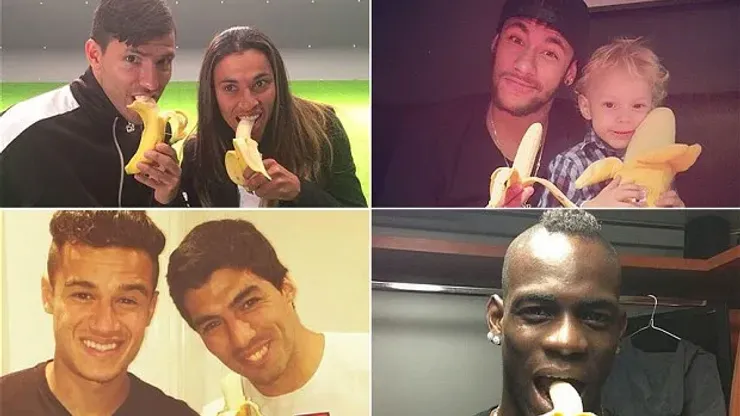It is easy to be cynical in the modern sports era, so it is easy to have doubts about the spontaneously wonderful viral social media campaign “We Are All Monkeys”. The campaign sprung up last weekend after a banana was thrown onto the Villarreal pitch at Barcelona’s Dani Alves. Alves picked up the banana and ate it. Almost immediately soccer players and personalities around the world took to social media, showing pictures of them eating a banana and using the hashtag #weareallmonkeys (or #somostodosmacacos in Spanish). This movement was to show that organized soccer deplored this racist act and people from around the world stood with Alves.
However, there is now a report in the Spanish paper AS that the spontaneity of the act may not have been spontaneous. The paper reports that Alves and teammate Neymar had asked a marketing firm to draw up an anti-racism campaign in March, after they suffered abuse from fans at Espanyol. The two players decided that next time a banana was thrown at them, the targeted player would eat the banana and the campaign would be launched. The assumption was that it was Neymar who would have taken action, but obviously Alves worked as well.
If this report is true that this seemingly viral campaign was a very well planned media moment, does that change our perception of what happened in the wake of the incident? Personally, the following thoughts ran through my head after reading the original article.
Who cares? The act of throwing a banana at any player is despicably vile, and regardless of how the campaign came about it has been a great success drawing attention to this problem and shame on those who perpetrate those acts. Regardless of whether it was a heat of the moment decision or a pre-funded effort, the result is the same and that is laudable.
The move showed incredible business savvy. Think about this timeline (if reports are accurate): the incident that prompted the campaign happened in March, so within a month Alves and Neymar had hired a company to create a media campaign they hoped would go viral based on what they assumed was a likely, but not assured event. The fact that it rolled out immediately and without a hitch as soon as the game was over was impressive; just ask anyone who works in the PR industry about turnaround time. Based on what we know, both of these players have bright futures in management as they showed in this instance incredible skill to launch a campaign quickly, efficiently, and passionately.
Is it wrong to be a little saddened that it was not spontaneous? While I am pleased with the overall result, the commercial aspect of it does slightly dampen the narrative. The romantic ideal of a group of people from around the world rising up spontaneously to decry gross racism and support a creative player was a great story. The pre-planning now leaves you wondering if such a social media movement is truly possible, but this again is a small worry.
Racism, while on the run, is still with us. Stepping back for a moment, it is sad to think that anyone needs to plan a major media campaign to fight the idea that foreigners are equated with monkeys (in a negative sense). The overwhelming support for Alves cannot hide the fact that these acts are still happening. This week, the Italian soccer federation handed down a penalty to Internazionale because of the racist chants and banners from its ultras section. While we can all take pride in the fact that in this moment we had a powerful symbol against the dark heart of racism, we still have to acknowledge that in many ways we still have a long road to travel.
200+ Channels With Sports & News
- Starting price: $33/mo. for fubo Latino Package
- Watch Premier League, Women’s World Cup, Euro 2024 & Gold Cup
The New Home of MLS
- Price: $14.99/mo. for MLS Season Pass
- Watch every MLS game including playoffs & Leagues Cup
Many Sports & ESPN Originals
- Price: $10.99/mo. (or get ESPN+, Hulu & Disney+ for $14.99/mo.)
- Features Bundesliga, LaLiga, Championship, & FA Cup
2,000+ soccer games per year
- Price: $5.99/mo
- Features Champions League, Serie A, Europa League & Brasileirāo
175 Premier League Games & PL TV
- Starting price: $5.99/mo. for Peacock Premium
- Watch 175 exclusive EPL games per season






